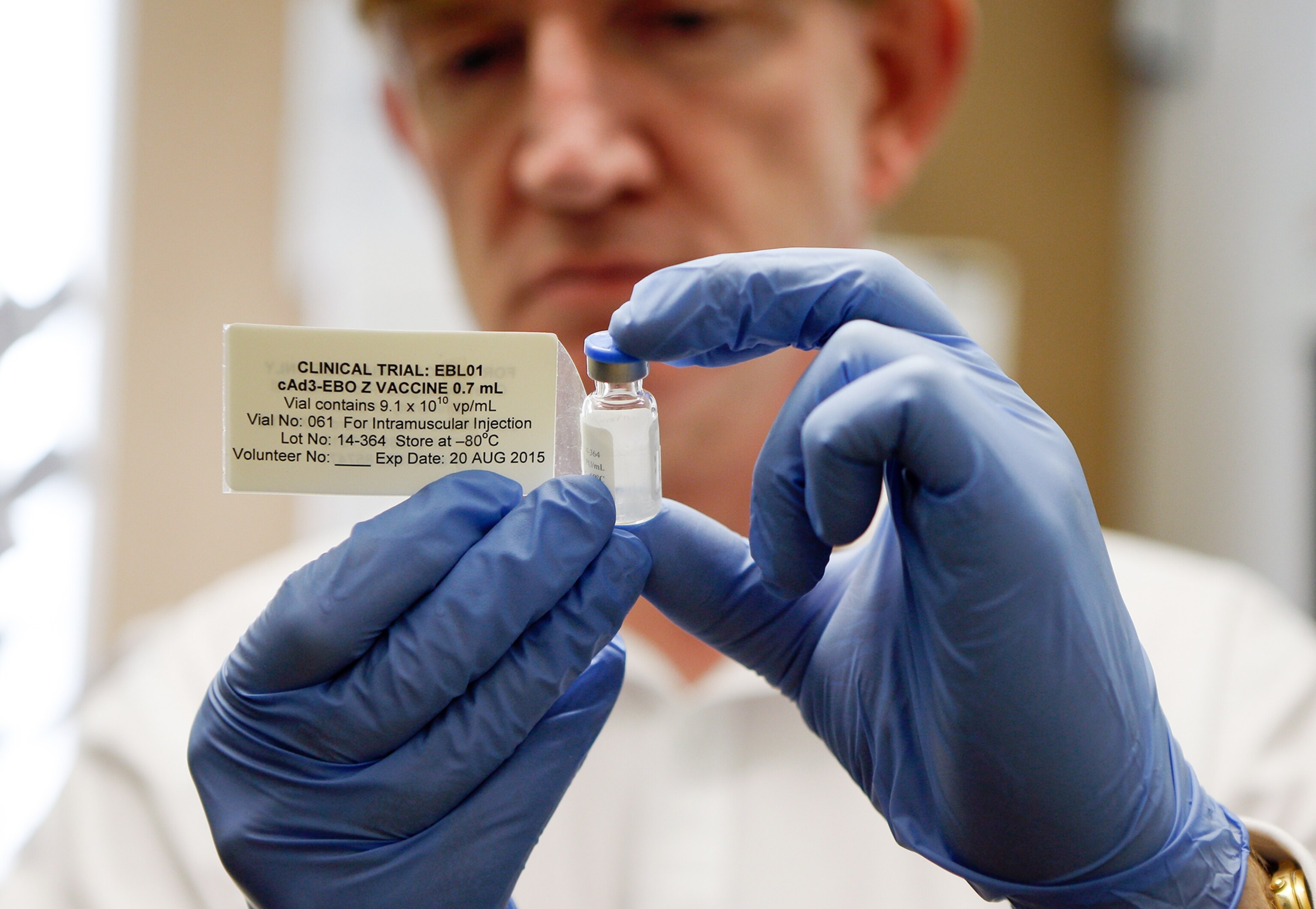
Long Quest for Ebola Vaccine Slowed by Science, Ethics, Politics
There are no approved vaccines or treatments, but some in development look promising.
DALLAS—Ebola vaccines are so effective in monkeys that macaques can be protected or rescued even if they're injected with a hundred times the lethal dose of the Ebola virus after vaccination. But no one knows for certain whether the vaccines will work in humans; the vaccines haven't yet been rigorously tested in people.
Just developing the vaccines to test in monkeys was a grueling, decades-long process that has killed scores of macaques since the 1990s. American researchers almost gave up. "No one thought you could protect with a vaccine, because [Ebola] was so aggressive," says Nancy Sullivan, a top official at the U.S. National Institute of Allergy and Infectious Diseases.
The insidious nature of the Ebola virus has been among the hurdles in the long, elusive quest to develop an effective vaccine and treatment for one of the most dangerous viruses the world has ever known. Progress also has been slowed by the hazards that come with researching it and—perhaps more than anything else—by the economic and moral questions of focusing on a pathogen that until the current outbreak had infected fewer than 2,400 people worldwide. (Related: "As Ebola's Spread Continues, Key Questions and Answers.")
At a time when malaria kills 600,000 people a year, tuberculosis kills 1.3 million, and AIDS 1.6 million, Ebola was a lower priority for many health officials.

But now the Ebola virus is exploding in West Africa, and its reach is moving well beyond there—to Europe and the United States. It has infected at least 2,400 people in West Africa during the past three weeks alone, and more than 4,000 deaths there have been linked to the virus since the outbreak began late last year. (Related: "Doctors and Nurses Risk Everything to Fight Ebola in West Africa.")
With news over the weekend that the virus had been transmitted within the United States for the first time—to a nurse who had treated a Liberian with the disease at a Dallas hospital—the need for a vaccine and better drugs suddenly has hit home with many Americans.
National Institutes of Health Director Francis Collins has put the politics of the issue into sharp relief, saying in an interview with the Huffington Post that a vaccine and treatments would have been ready now if it hadn't been for federal budget cuts to basic research.
"It's not like we suddenly woke up and thought, 'Oh my gosh, we should have something ready here,' " Collins said. If funding hadn't been slipping over the past decade, he said, "we would have been a year or two ahead of where we are, which would have made all the difference."
Now the effort to produce a vaccine, or a more effective treatment, has become a race against a virus that typically has killed 70 percent of its victims. The World Health Organization warned Tuesday that Guinea, Liberia, and Sierra Leone could see as many as 10,000 new Ebola cases per week by year's end.
In the coming months, as caregivers, politicians, and armies struggle to deal with the spiraling number of cases, a handful of vaccines and treatments will be tested on humans for the first time.
If one or more works and can be produced in adequate quantities, the course of the epidemic might be altered and hundreds of thousands of lives saved. And it would rewrite the story of the next Ebola epidemic or stop the story from being written. (Related: "Every Newly Emerging Disease Like Ebola Begins With a Mystery.")
But if the vaccines and drugs fail in people, the world could be faced with the enduring casualties and mass fear that are the stuff of science fiction—or history.
Every Organ at Once

Under a microscope, the Ebola virus is wormlike and huge. It's roughly ten times as long as the flu virus and twice as long as smallpox (though a little skinnier than both). Named for a river that flows through what is now the Democratic Republic of the Congo—near where the first person was identified with the virus 38 years ago—Ebola can infect nearly every kind of cell in the body.
Ebola enters various organs and quickly makes copies of itself, overwhelming the heart, lungs, liver, digestive system, muscles, and brain. Some viruses, such as the flu, can be blocked in one place, like the lungs, but Ebola must be stopped in every organ at the same time to prevent it from spreading.
That's why all the initial efforts to develop a vaccine by trying to boost the immune systems of lab monkeys failed.
It was only when the Vaccine Research Center's Sullivan was able to recruit another of the immune system's foot soldiers—T cells—that she made headway against the virus.
The vaccine she helped develop uses a virus from chimps, which causes no symptoms in people, to carry a harmless bit of protein from the surface of the Ebola virus into a lab monkey's immune system. That little bit is enough to trigger the immune system to make antibodies and targeted T cells, which are spread throughout the body, to fight off subsequent infection.
A second major vaccine approach has a similar effect but uses a potentially more effective delivery system to carry the bit of Ebola. The Ebola protein is mounted onto a harmless virus—the metaphoric wolf (Ebola) dressed in a sheepskin (another, harmless virus).
The bodies of lab monkeys have interpreted this as an attack from Ebola and have developed an immune response. "I'm very confident in that vaccine," said Thomas Geisbert, a professor of microbiology and immunology at the University of Texas Medical Branch at Galveston. "It works fantastically well in monkeys."
We should know soon whether the two vaccines work as well in people.
The human testing process, fraught with ethical concerns, began last month when ten healthy American volunteers were injected with Sullivan's vaccine, which is now owned by pharmaceutical giant GlaxoSmithKline. There were "no red flags," Anthony S. Fauci, director of the National Institute of Allergy and Infectious Diseases, told the Washington Post.
Healthy people in England were next to be injected with the virus. And last week shots were begun in Mali, which is in West Africa but has not seen any Ebola cases. If all goes well, up to 3,000 more people, including children, will begin getting vaccinated in January, in an effort to prove that it's safe and effective.
A version of Geisbert's vaccine is being tested in parallel. Clinical trials were approved in early September, and Iowa-based NewLink Genetics Corporation began the same step-by-step testing process on several continents.
Vaccinating for the Next Epidemic

Normally this kind of preliminary testing can take a year or more before companies are allowed to try their vaccine on people vulnerable to disease. But with dozens of people dying every day, there isn't that kind of time.
David Vaughn, Glaxo's head of external R&D for the North American Vaccines Discovery and Development division, hopes to bring Glaxo's vaccine into African nations hardest hit by Ebola as soon as January, even as its safety is still being confirmed.
If the vaccine works, Vaughn said, it will still take most of next year to optimize it for production and deployment and to manufacture enough doses to make a dent in the outbreak.
And there are other obstacles. The GSK vaccine currently has to be stored at minus 60 degrees Fahrenheit. In countries where electricity isn't reliable, even in capital cities, that's a huge problem, Vaughn said.
"Hopefully the vaccine won't be needed for this outbreak—they will be able to contain it in the next six to nine months," Vaughn said. "If it's not needed for this epidemic—great. It'll be there for the next one."
Drugs, Blood, and Debate
The search for an Ebola treatment, for those who've contracted the virus and for whom it may be too late for a vaccine to be effective, has been similarly fraught.
Without any approved drugs, current Ebola treatment consists mainly of so-called supportive therapy, in which the patient is kept hydrated and symptoms including fever and other illnesses, like malaria, are treated.
Thousands of drugs have been screened against the virus, in hopes that one or two would kill it. Probably hundreds of those show some effectiveness in a Petri dish, and many also work against the virus in small animals.
"I've got shelves of things that protect mice and guinea pigs against Ebola," said Geisbert.
But only two drugs have been shown to protect monkeys against the virus. The first, ZMapp, was given to a handful of Ebola victims, including American missionaries Nancy Writebol and Kent Brantly, before the stockpile ran out.
The drug is produced by genetically engineering tobacco plants, and the company that makes it, Mapp Biopharmaceutical of San Diego, is waiting for its next crop to grow. A Spanish nurse who contracted Ebola was set to receive a dose of ZMapp last week, according to the Associated Press, and is recovering well.
The second medication, called TKM-Ebola, was given to a few recent patients, including missionary Richard Sacra, a doctor who continues to regain strength.
The drugs were used in people without going through the usual federal approval process, but those few doses don't prove anything. Brantly, Writebol, Sacra, and Spanish nurse Teresa Romero Ramos received multiple treatments and might have survived regardless of whether they took any drug at all. All researchers can say for certain is that the drugs aren't universally fatal.
Two antiviral drugs, brincidofovir and favipiravir, have also been tried on a few Ebola patients, including Thomas Eric Duncan, the Liberian who arrived in Dallas in late September with the virus. (Related: "Ebola Health Care Worker Sick Because Safety Rules Weren't Followed, Officials Say")
Brantly, meanwhile, also received blood from a boy who had recovered from Ebola, with the thinking that antibodies in the boy's blood would help Brantly fight the disease. After he recovered, Brantly donated his own blood to help Sacra, NBC News freelancer Ashoka Mukpo, and Nina Pham, the Dallas nurse who was the first health care worker there to become ill after treating Duncan.
Pham is in stable condition at the hospital where she works, Texas Health Presbyterian Hospital, and said in a statement Tuesday that she was doing well. A second health care worker who treated Duncan, an unidentified woman, also has tested positive for Ebola and, like Pham, is in isolation at the hospital, authorities said Wednesday.
There has never been a careful study testing the efficacy of the blood, known as convalescent serum, so no one knows if it is effective.
Debate remains over exactly how trials for these treatments should be conducted. Some argue that standards of drug testing shouldn't be lowered simply because we're in the middle of an epidemic. Patients will be better off in the long run if scientists can get a definitive answer about what works and what doesn't, they say.
Others argue that there are acceptable ways to speed up the trial process.
"Speed is everything here," said Piero Olliaro, a tropical medicine specialist and visiting professor at the University of Oxford, in England. He doesn't like the idea of giving some people a placebo, which, with a 50 to 70 percent death rate for Ebola, nearly condemns them to die. He wants trials rolled out simultaneously and almost immediately for all the potential drug candidates and convalescent serum.
"We are ready to go," said Olliaro, who is heading to Guinea this week to begin laying the groundwork for trials he hopes to start in about a month.
Scramble and Wait

Beyond the ethical debates around trials, the danger of the virus itself has slowed down the push for solutions.
Sullivan, who is chief of the biodefense research section at the U.S. National Institute of Allergy and Infectious Diseases' Vaccine Research Center, says that work on Ebola takes at least two times as long as work on a disease like malaria.
Researchers have to get special approval to work with the deadly pathogen and then have to take the same kinds of precautions as health care workers: meticulously dressing and cleaning up, and wearing stifling masks and gloves that make careful research harder and slower.
And then there's politics.
The United States began investing heavily in Ebola research only after the terror attacks of September 11, 2001, when it feared the virus could become a weapon of international terrorism. Such research has to be funded by taxpayers, because no company wants to invest the kind of time and money it takes to develop a vaccine or drug with a market that seemed—until this year—to include just a few hundred people a year.
Some public health officials debate whether it would even have been ethical to spend time and money on Ebola when so many other diseases claim more lives.
NIH funding has essentially been flat since it peaked in 2004; accounting for inflation, that means less federal money has been available for research. Funding for biodefense research has fallen from $1.3 billion to $1.27 billion since 2010, budget documents suggest.
Whatever the reason for the delay, Olliaro said, the current situation should provoke us to rethink research and development for all deadly emerging diseases.
"We should not let this crisis go past," he said, "without trying to make the best out of it."